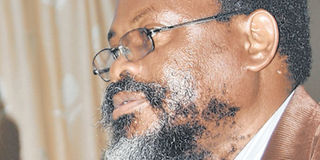It’s no easy walk to freedom for K’Olale

University Academic Staff Union secretary-general Muga K’Olale announces a lecturers’ strike on Tuesday. Photo/ANTHONY OMUYA
Times were when university education was equated to revolutionary thinking.
Academic staff easily identified with the masses and intellectual discourses took the dichotomy of the bourgeoisie and the proletariat.
Political ideologies of Lenin, Karl Marx, Voltaire, Marx Engels et al dominated lecture theatres.
The academics, mainly in the liberal arts, were known for unconventional dress style (African or Mao Tse-Tung style) complete with long beards and sometimes unkempt hair. Not any more.
University lecturers now cut the image of corporate executives, well trimmed and primed in designer suits complete with the trappings of the capitalist world erstwhile pilloried by their peers of the yester-years.
Three strikes
But not so Mr Muga K’Olale, the secretary general of the Universities Academic Staff Union (Uasu), who has led public university lecturers in record three strikes in eight years.
He represents the academics of the radical tradition. Activism and revolutionary fire keeps burning inside him.
He sports a long white beard that sometimes looks frightening, but easily stands him out as the face of Uasu.
A political philosopher to the core, he believes in social justice and eschews labour exploitation.
His radicalism did not start yesterday. Mr K’Olale was involved in student politics right from his days at the University of Nairobi in the early 1980s.
Because of his perceived leftist leaning, he was arrested and later jailed after the failed 1982 coup alongside other student leaders.
Fighting spirit
But the seizure and subsequent torture never broke him down. He’s kept the fighting spirit alive. He takes things in his stride, hardly minces his words and never shies away from confronting his nemesis.
When he announced a few days ago that Uasu would not negotiate with the Government unless it had concrete proposals on the table, many thought he was bluffing.
As it came pass, he led his team in snubbing entreats by Higher Education minister Margaret Kamar, her assistant Kilemi Mwiria and the permanent secretary, Prof Crispus Kiamba.
“We made it clear to them that efforts to meet us were meaningless, so we couldn’t honour their invitations,” he said. “If you want to negotiate, you must be ready with concrete proposals, not empty promises.
“Since we gave them our proposals in 2009, they kept quiet until the other day when they realised we were dead set for the strike. “That’s when they started making frantic efforts to reach us,” he explains. “What was the rationale other than seeking a PR stunt?”
As it were, this was an irony of sorts.
Their interlocutors are former colleagues. Prof Kamar was a lecturer at Moi University before resigning in 2007 to join politics. She was appointed a minister in August.
Dr Mwiria was the founding secretary-general of Uasu and together with Dr K’Orwa Adar, led the longest lecturers’ strike in 1993/94, paralysing university operations for nine months.
They were sacked from the universities and forced into exile.
Dr Mwiria only came back in 2002 to contest the Tigania West seat, which he won and was appointed an assistant minister in charge of Higher Education, a position he has held for the past nine years.
Prof Kiamba was the vice chancellor of the University of Nairobi in 2004 when the lecturers went on strike.
Mr K’Olale, a lecturer in political philosophy and international humanitarian law at Egerton University, was first elected deputy secretary general of Uasu in 2003 and became the secretary-general in 2005 and retained the seats in subsequent elections, the last being in May.




